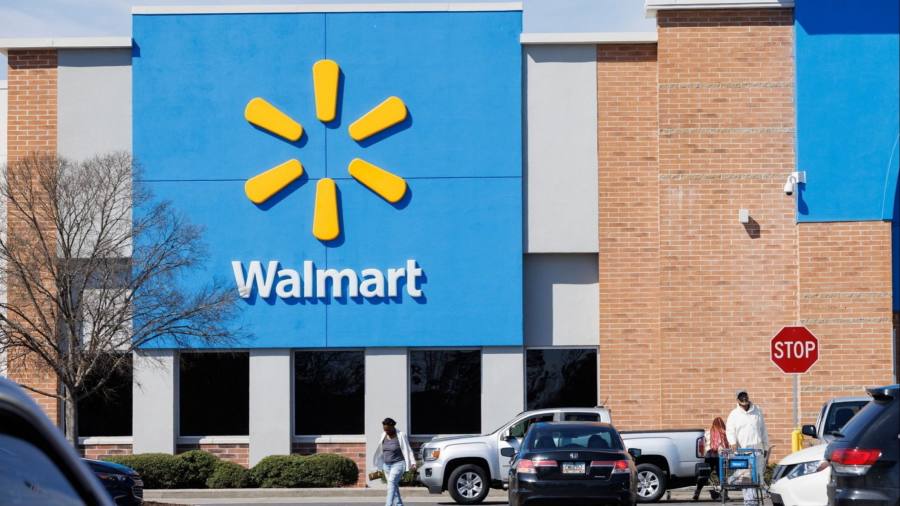Wal-Mart said it expects sales growth to moderate in the second half of this year, prompting the world’s largest retailer to issue a cautious outlook for 2024 as it notes the impact of the Fed’s aggressive campaign to raise interest rates.
The company set sales and earnings forecasts below analyst expectations, even as it reported a strong fourth quarter in which bargain-hunting shoppers supported spending in December, which was the biggest month in sales on record for Walmart’s U.S. operations.
“There’s a lot we don’t know,” Wal-Mart CEO Doug McMillon told analysts during an earnings call Tuesday. We could go into stagnation. We don’t know what happens to consumer spending. We don’t know what happens to layoffs [and] Family income. And since we’re so early in the year and there are so many unknowns at the moment, we’re simply taking a cautious view.”
Wal-Mart executives said strong December sales in the US were driven by food, but that was partially offset by lower general merchandise sales. At its Sam’s Club subsidiary, management said positive sales trends during the fourth quarter for discretionary items like apparel and merchandise were still in effect as recently as the Super Bowl and Valentine’s Day.
Chief Financial Officer John Rennie said Wal-Mart expected sales growth to be “strongest” in the first six months of this year, then moderate in the back half on an uncertain economic backdrop.
“We haven’t been in a position where we’ve seen the Fed tighten this soon. We’re seeing issues where defaults are going up and things like auto loans, where savings rates are going down. And there’s a lot of unknowns in the back half of the year.”
Home Depot echoed the weak outlook for Walmart, which warned its full-year earnings could fall for the first time since the financial crisis, on the back of rising inflation and subprime mortgages dampening consumer demand for home improvements.
The do-it-yourself retailer, like many economists, assumes steady economic growth and consumer spending in 2023, said Richard MacPhail, chief financial officer for Home Depot.
“Over the past seven quarters, we have seen our transactions gradually return to normal as consumer spending shifts from goods to services,” he said. “If this transition continues at its current pace, the home improvement market will be down single digits.”
With more than three-quarters of a trillion dollars in annual sales between them, Wal-Mart and Home Depot are often seen as the benchmarks for the American consumer, with the latter being more sensitive to the huge US real estate market.
Wal-Mart shares recovered early to close up 0.6 percent on Wall Street on Tuesday, while Home Depot sank more than 7 percent.
The guidance from the two retail chains comes after several weeks of stronger-than-expected US economic data, including inflation, job growth and retail sales, that prompted markets to reassess their bets that the Federal Reserve will cut interest rates later this year in response to The decision of the possible slowdown of the US economy.
After the groundbreaking jobs report, Fed Chairman Jay Powell warned earlier this month that interest rates may have to be raised higher than investors expect because a strong labor market means it may take longer for inflation to return to the central bank’s 2 per cent target. Cent.
Wal-Mart expects net sales to grow 2.5 to 3 percent for the current fiscal year, below Wall Street’s forecast for a 3.3 percent increase. It expects adjusted earnings in a range of $5.90 to $6.05 per share for 2024, below analyst expectations of $6.50.
In the fourth quarter ended Jan. 31, net sales rose 7.3 percent from a year ago to $164 billion and diluted earnings jumped to $2.32 per share, both ahead of market expectations.
Wal-Mart said it expects to continue to gain from high-income shoppers, who are looking for discounts amid persistent inflation.
“We’re gaining share across income groups, including at the higher end, which accounted for nearly half of the gains we saw in the US again this quarter,” McMillon said.
Home Depot expected revenue and comparable sales in fiscal 2024 to be flat year-over-year, while diluted earnings per share would decline by “mid single digits.”
That would mark the retailer’s weakest sales growth since fiscal 2010, and the first drop in annual profit since fiscal 2009, according to Refinitiv data. Analysts expected slight growth.
“We’re seeing some price sensitivity,” CEO Ted Dekker told analysts during an earnings call Tuesday, which was greater in the fourth quarter than it was in the prior three months.
Home Depot’s bleak outlook accompanied the company’s fourth-quarter sales and profits that were just above and below Wall Street’s expectations, respectively, and transaction volumes that were down 6 percent from a year ago.
“We’re really seeing a unique environment with many cross-currents right now. There’s obviously rising inflation and rising interest rates. A tight labor market is adjusting equity in the housing markets. Given all of that, we expect a moderation in demand for housing,” Dicker said. home improvement” this year.

“Typical beer advocate. Future teen idol. Unapologetic tv practitioner. Music trailblazer.”







More Stories
JPMorgan expects the Fed to cut its benchmark interest rate by 100 basis points this year
NVDA Shares Drop After Earnings Beat Estimates
Shares of AI chip giant Nvidia fall despite record $30 billion in sales